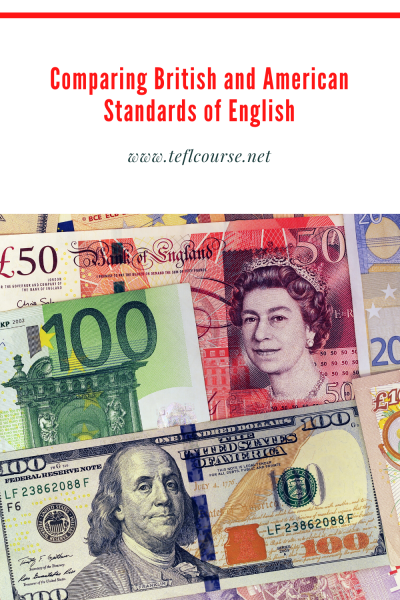Comparing British and American Standards of English

Why are British and American versions of English so different? British and American English, while, broadly speaking, are mutually intelligible (each party can understand and communicate with each other), there are notable differences that make one wonder why there is a difference at all? In this essay, I’ll briefly discuss some key differences in these two dialects, and further, provide reasons and evidence explaining said differences.
This post was written by our TEFL certification graduate Betsy W. Please note that this blog post might not necessarily represent the beliefs or opinions of ITTT.
Differences between variants
If you were to ask someone in America to say something in a British accent, you would likely get a response of that person saying something in Received Pronunciation (or RP English), which is the most famous dialect of British English (think of how the royal family would speak). Interestingly, RP English is a created dialect, meaning it didn’t naturally occur over time but was created by an English professor in the 1920s named Lord Reith, who believed there was a “correct” why to speak and took it upon himself to instill this belief into the upper classes of Britain (1). However, the further you look into British dialects, the more you will find hundreds upon hundreds of naturally occurring dialects. Even just within its biggest city, London, there are distinct differences in dialects (RP English vs Cockney are both centralized in London) (2). America on the other hand, while having many varying accents (such as New England accent vs Southern), they are less in number and more spread out (3). Beyond accent (sound) differences, there are also differences in spelling and words: Colour vs color; grey vs gray; meter vs meter. These are all words that, though spelled differently, have the same meaning and usage. British and American English also have many words where there are two separate words with the same meaning: trouser vs pants; autumn vs fall; nappy vs diaper (4).
Also Read: Should I pay for a job placement teaching English abroad?
Reasons of variants derivation
So why are there all these differences, when American English essentially is a descendant of British English, as a seen example in the preservation of British features (specifically Shakespearean/Elizabethan) in the American Appalachian dialect (5)? It’s a natural occurrence that language shifts and changes over time, which is how dialects in general shift and change when they are left isolated from outside language/influence, but this is also in part due to influence from outside languages. For example, the dialects in northern English (excluding Scottish), were heavily influenced by Norse/Scandanavian languages who had at one point invaded the country and after time happened to settle in the more northern regions of the island (7).
Do you want to teach English abroad? Take a TEFL course!
In conclusion, to answer the question of ‘why’ there are differences in British vs American English, it largely boils down to the fact that British English has so many dialects packed into a tiny space due to its having been a language in that location for thousands of years and having the time to develop such rich variety. American English has been developing its uniqueness over a shorter amount of time, which has led to less variety overall, but enough shift to make a distinct difference between it and British English (6) (8).
Apply now & get certified to teach english abroad!
Speak with an ITTT advisor today to put together your personal plan for teaching English abroad.
Send us an email or call us toll-free at 1-800-490-0531 to speak with an ITTT advisor today.
Related Articles:
- TEFL Breakdown - What Subjects Will Your TEFL Course Cover?
- 5 Reasons Why Teaching English Abroad Enhances Your Career Prospects
- Top 5 Tips: How to Learn a New Language When Teaching English Abroad
- 4 Top Tips for Getting Your TEFL Certificate on the Road
- The How-To Guide for Americans to Teach English in Europe
- 5 Great Places to Teach English Abroad Without a Degree




